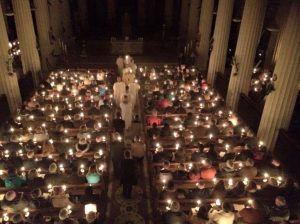
By Sarah Mac Donald - 16 April, 2017

Easter Vigil Mass at St Mary’s Pro Cathedral in Dublin. Pic: courtesy Archdiocese of Dublin.
In his homily for Easter, Archbishop of Dublin and Primate of Ireland Diarmuid Martin has described Christianity as a “faith of new life and of liberation”.
At the Easter Vigil Mass in St Mary’s Pro Cathedral, the Archbishop said that despite this, many had experienced Christianity as a “faith of prohibitions”.
Though certain theologies spoke about freeing people from sin, they had developed a concept of sin and sinner which made it almost impossible for a sinner ever to feel himself or herself truly liberated, he said.
“There were so many rules that many were left with a sense of scrupulosity which left them trapped and oppressed by guilt and doubts.”
Archbishop Martin added that this had created a religion of fear, so that even when people tried to live a good life they were never left with a sensation of being free.
However, the Archbishop also emphasised that Christianity is not a religion of anything can go.
“The good life is a life lived in goodness rather than in libertinism.”
But the understanding of sin not as a failure to observe rules and norms but as a failure to love had been overlooked.
Elsewhere in his Easter homily, Archbishop Martin said that the Christian cannot live at peace in a world where people are oppressed.
“If Christianity is a faith of liberation, then the Christian and the Church of Jesus Christ must be a place of real witness to the reality of the powers of darkness which still today trap people in oppression.”
He questioned how Christians “can be insensitive to the needs and the suffering of the bodies of children who are victims of violence and abuse; how can we not be angry with those who support an industry which fosters a drug trade which holds people trapped in addiction; how can we hide away from the fact of the sexual exploitation especially of women; how can we be insensitive to hunger and yet spend millions on a false culture of the body; how can we be unconcerned by political and economic cultures which leave men, women and children unable to realise their full abilities?”
He said that “None of us can claim to be free if we live immune to the fact of so much oppression and need for liberation. Freedom is not the privilege of the few: it is a call to take responsibility for all.”
He stressed that too often we acquiesce in watching oppression. “Too often the Church has fallen into the logic not of new life but of siding with power and conformity and safety.”
Christian theology, Dr Martin stated, is always a theology of liberation, but it is not an ideology of liberation. “Not every ideology of liberation is really one which will enable people to be free,” he said.
A true theology of liberation is not purely political. True liberation theology is one which will never leave any politics happy, he said.
The Archbishop also suggested that there is legitimate separation between Church and State, but both can benefit from the contribution of authentic believers.
Easter Sunday began this morning with thousands of faith gathered in parishes across the country for Dawn Masses.
The Easter Sunday Dawn Mass has been growing in popularity in recent years, with many feeling a deep connection with their faith as they celebrate the Lord’s Resurrection while watching the dawn break.
Later this morning, the Eurovision Mass for Easter Sunday will be celebrated in the Cathedral of the Immaculate Conception, Sligo at 10 am by Bishop Kevin Doran.
It will be broadcast on RTÉ One with delayed transmission at 11 am on RTÉ Radio 1 Extra. It will also be broadcast in Belgium, France and Switzerland.